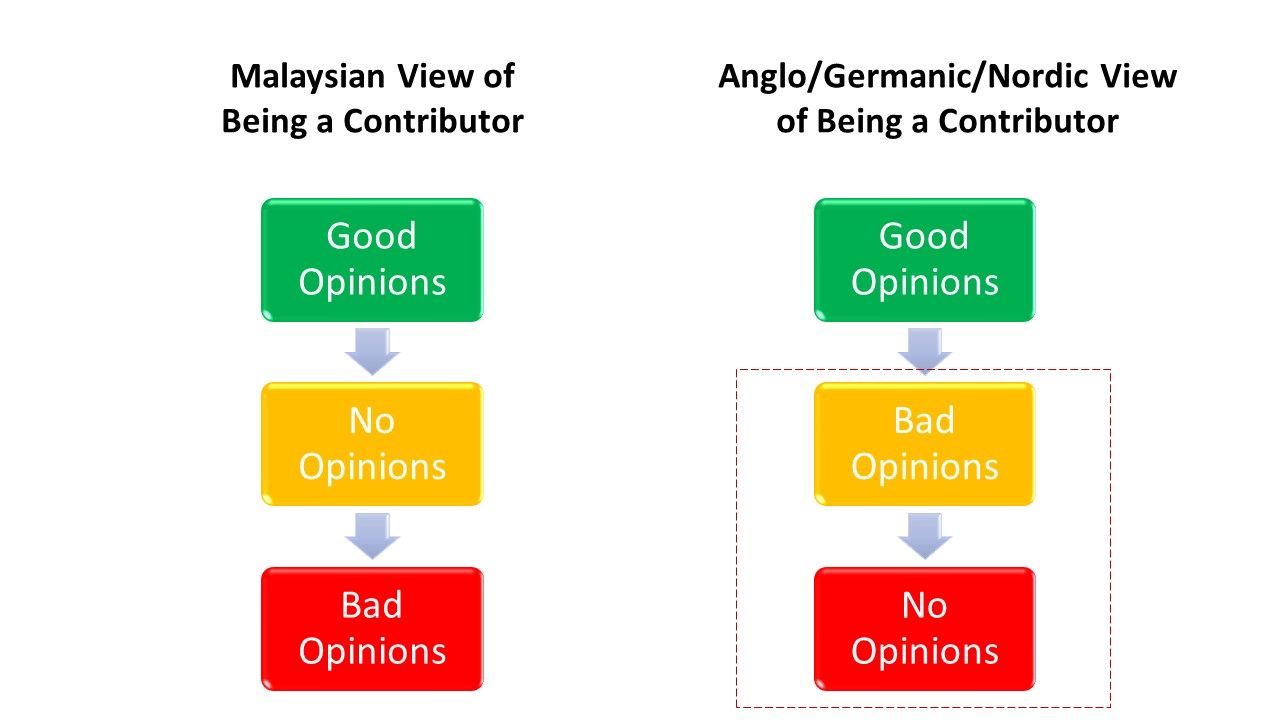Have you ever had a 15-minute internal conversation with yourself to decide if you should share your idea or not, just to have your colleague voice out the exact same idea during a company meeting? And when that same idea was hailed as a fantastic solution to the problem at hand, you kicked yourself with regret? Or have you been part of the classic situation of going into a team discussion and silently taking very good notes while your more outspoken international colleagues engage in a debate?
Many feel that shyness is the reason for the seeming lack of contribution from Malaysian staff during team meetings. But shyness is a quality that is present in all cultures. The likely reasons may be due to the cultural values that are unique to Malaysians. For example, Malaysians are a hierarchical culture so there is a tendency to maintain respectful silence as an observer and to defer opinions to those of a higher authority (e.g. your team leader or line manager). Malaysians are also risk-avoidant, so if in our minds we think that our opinion is not good enough, the best thing is to keep quiet so as not to say something silly (no opinions) rather than speak up and give the wrong answer (bad opinions). However, if you are a Malaysian working with an Anglo, Nordic or Germanic manger, you may be surprised to find that they value the contribution of good opinions or not-so-great opinions more than the silent observation of staff who are only physically present.

This does not mean we have the license to be a loose cannon, spouting whatever comes to mind without any merit. There are good reasons to adapt our communication approach to one that is done in a calculated manner, ensuring we contribute ideas and opinions that are of value to our managers. Consider the following:
- Our contribution reflects who we are and defines the value that we bring to our organization. Those who consistently contribute valuable ideas are often the same people who are given opportunities to chair meetings, lead new initiatives and engage with other prominent voices in the organization. When we aren’t fearful of voicing out solutions to problems or addressing the pros and cons of a situation, we will be viewed as team players with great potential for leadership positions.
- It shows we are invested in our organization. Silent observers do what they’re told; valuable contributors decide what needs to be done. Having an active share in being a part of the decision-making process allows others to see that we are interested in helping our organization achieve its goals and objectives.
- Consistent practice will increase our overall confidence and help us stand out from the rest. Due to our cultural influences, speaking out freely may not come so naturally to most of us. However, having the commitment to consistently prepare well and have one or two points that are of value to every discussion will give us the confidence to continue giving valuable contributions. It will set us apart as individuals who are able to effectively adapt to any changing work environment and communication style.
When we can accurately identify the cultural reasons behind some of our behaviours at work, we can learn effective strategies that will enable us to adapt to different work styles of people from a variety of backgrounds. This will improve collaboration efforts and minimize the potential for misunderstandings. Our many cross-cultural training programs are designed to specifically address these situations and provide proven solutions for you.
By: Boleh Blogger
